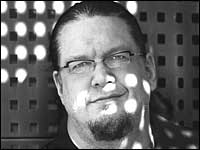
Friday, July 6, 2007
Wednesday, July 4, 2007
Happy Independence Day!
The 4th of July is a great holiday, with special meaning for empiricists. Today we celebrate the anniversary of the day a group of Deists signed a document that claimed independence based on the philosophy of The Enlightenment. Far from creating a "Cristian Nation," the signatories of the Declaration of Independence envisioned a country based on the principles of liberalism, personal freedom, and government by "the consent of the governed." Freedom of thought and belief are some of the most valuable and enduring legacies of our Founding Fathers.
To commemorate the occasion, I reproduce below some quotes from the author of the DoI. As indicated bu these selections, Tomas Jefferson should be remembered for his strong rationalist beliefs; at one point he literally cut out all the description of miracles from his Bible.
"To talk of immaterial existences is to talk of nothings. To say that the human soul, angels, god, are immaterial, is to say they are nothings, or that there is no god, no angels, no soul. I cannot reason otherwise: but I believe I am supported in my creed of materialism by Locke, Tracy, and Stewart. At what age of the Christian church this heresy of immaterialism, this masked atheism, crept in, I do not know. But heresy it certainly is."
"They [the clergy] believe that any portion of power confided to me, will be exerted in opposition to their schemes. And they believe rightly; for I have sworn upon the altar of god, eternal hostility against every form of tyranny over the mind of man. But this is all they have to fear from me: and enough, too, in their opinion."
"If we did a good act merely from love of God and a belief that it is pleasing to Him, whence arises the morality of the Atheist? ...Their virtue, then, must have had some other foundation than the love of God."
"Believing with you that religion is a matter which lies solely between man and his God, that he owes account to none other for his faith or his worship, that the legislative powers of government reach actions only, and not opinions, I contemplate with sovereign reverence that act of the whole American people which declared that their legislature should 'make no law respecting an establishment of religion, or prohibiting the free exercise thereof,' thus building a wall of separation between church and State."
To commemorate the occasion, I reproduce below some quotes from the author of the DoI. As indicated bu these selections, Tomas Jefferson should be remembered for his strong rationalist beliefs; at one point he literally cut out all the description of miracles from his Bible.
"To talk of immaterial existences is to talk of nothings. To say that the human soul, angels, god, are immaterial, is to say they are nothings, or that there is no god, no angels, no soul. I cannot reason otherwise: but I believe I am supported in my creed of materialism by Locke, Tracy, and Stewart. At what age of the Christian church this heresy of immaterialism, this masked atheism, crept in, I do not know. But heresy it certainly is."
"They [the clergy] believe that any portion of power confided to me, will be exerted in opposition to their schemes. And they believe rightly; for I have sworn upon the altar of god, eternal hostility against every form of tyranny over the mind of man. But this is all they have to fear from me: and enough, too, in their opinion."
"If we did a good act merely from love of God and a belief that it is pleasing to Him, whence arises the morality of the Atheist? ...Their virtue, then, must have had some other foundation than the love of God."
"Believing with you that religion is a matter which lies solely between man and his God, that he owes account to none other for his faith or his worship, that the legislative powers of government reach actions only, and not opinions, I contemplate with sovereign reverence that act of the whole American people which declared that their legislature should 'make no law respecting an establishment of religion, or prohibiting the free exercise thereof,' thus building a wall of separation between church and State."
Subscribe to:
Posts (Atom)
